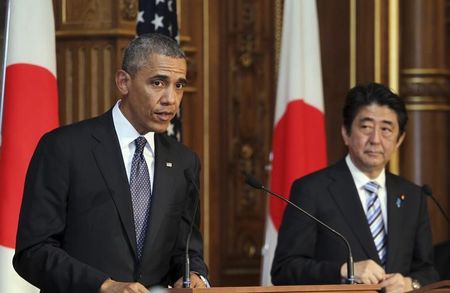By Kiyoshi Takenaka and David Alexander
TOKYO (Reuters) - Japan and the United States agreed on Wednesday to map out how they will work together if Tokyo needs to use force to help protect a friendly country under attack, as they update defence cooperation guidelines for the first time in nearly two decades.
The development follows Prime Minister Shinzo Abe's historic step away from Japan's post-war pacifism in July, when the Japanese government reinterpreted pacifist Article 9 of the constitution to end a ban that has kept its military from fighting abroad.
The interim report on the update, which is intended to give general direction of the revision, is attracting close attention from China and South Korea, which suffered from Japan's aggression before and during World War Two.
Tokyo and Washington also said they would build a seamless security framework to better defend Japan and extend the areas of cooperation to space and cyberspace.
"The two governments will take measures to prevent the deterioration of Japan's security in all phases, seamlessly, from peacetime to contingencies," the interim report said.
The United States is obliged to defend Japan under their bilateral security treaty.
The first guideline update in 17 years comes as Japan faces tough security challenges from an island spat with China and North Korea's missile and nuclear projects, and as the United States tries to shift its diplomatic and security focus to Asia.
When defence and foreign ministers from the U.S. and Japan, the world's largest- and third-largest economies, met in Tokyo last October, they agreed to update the defence cooperation guidelines by the end of 2014 to respond to the changing security environment in the region and beyond.
"These revised guidelines will capture the greater scope of our alliance cooperation, reflecting its more global nature," a senior U.S. State Department official said on condition of anonymity.
"By clearly describing how the United States and Japan will operate in each of these areas during peacetime, during low-level grey zone provocations or during an armed attack, the revised guidelines will provide the policy direction for a stronger alliance, more capable of deterring threats and contributing to global security," the official said.
China on Wednesday expressed concerns that the update would broaden the bilateral alliance beyond its historical mandate.
"The Japan-U.S. alliance is a bilateral arrangement set up under specific historical conditions. It should not exceed its bilateral scope and should not harm the interests of third parties, including China," Chinese foreign ministry spokesman Hong Lei told a news conference in Beijing before the interim report was released.
"We are paying close attention to Japan and the United States' relevant moves to adjust their defence cooperation guidelines," Hong said.
Some countries in the region including China, South Korea and Australia had been briefed on planned changes in the guidelines, the U.S. state department official said.
The new guidelines will specify bilateral cooperation in the event that a country close to Japan is attacked and the use of force allowed under the July decision to lift a ban on exercising the right of collective self-defence, or aiding an ally under attack, the interim report said.
In the new guidelines, Japan and the U.S. will also agree to cooperate in such areas as peacekeeping operations, maritime security and logistics support, in a bid to promote regional as well as global peace and security, the interim report said.
Efforts by Japan and the United States to strengthen their security ties could be put to the test soon as the United States carries out attacks on Islamic State targets in Syria and Iraq, analysts said.
"The Obama administration has found itself having no option but to take military action, and it may turn into a quagmire," said Tetsuro Kato, political science professor at Waseda University.

"There is bound to be a request to Japan (for support), and that's the request Japan needs to meet."
(Editing by Linda Sieg and Jeremy Laurence)
